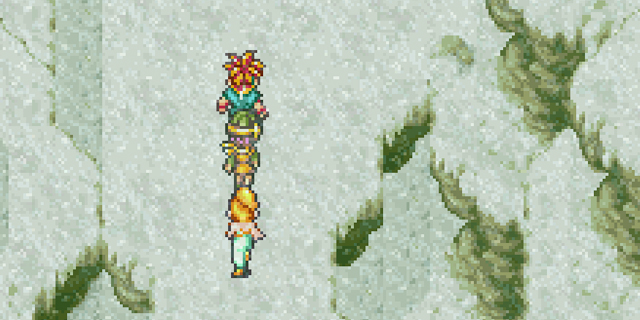
It was during a blisteringly hot, humid summer night that an image of snow brought a smile to my face. I was sitting in my sauna-like apartment, trying not to sweat through my thin layers of clothing (and failing) when I came upon a thread on the Internet about video games. This is not uncommon; seeing a comment thread about video games on the Internet is like walking outside and seeing other buildings. I was about to go to sleep when I saw a comment that I couldn’t shake.
It was about Chrono Trigger. Of course it was. It’s no secret that it’s my favorite game ever, but the comment I read could apply to any game in which the player has a connection to the characters they’re controlling.
“Whenever I played Chrono Trigger and I was on the snowy plains, I always made sure to save inside of the cave, because I didn’t want them to get cold.”
On the surface, this is silly. Absurd. Cold? Game characters don’t get cold, particularly after you shut the power off. They don’t exist. They don’t get angry at you for abandoning them in the frigid wilderness instead of placing them in a warm cave, where they can start a fire and rest for the evening.
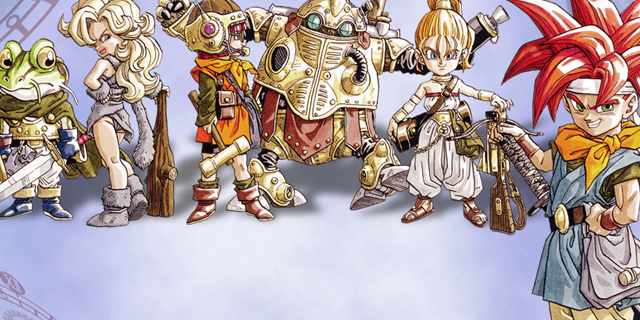
This innocent notion that characters have lives and experiences between play sessions becomes more endearing when you look back and reflect. Didn’t you have a stuffed animal as a kid? Didn’t you have a precious ball glove, or a hockey stick or lucky hat that you took everywhere, cherishing it as though it were a member of your family?
You know that photo you have of your parents? Grandparents? Husband? Wife? Girlfriend? Boyfriend? Sister? Brother? Best friends? The picture is an inanimate object. It’s a printout of a moment captured in time. But I’ll bet you’ve looked at a photo of somebody important to you and kissed it. Maybe it got you through a tough spot, or prompted you to call the person in the photo to tell them you loved them. We are capable of placing great importance on objects and keepsakes, that otherwise wouldn’t have much value.
Role playing games are different from other genres in that players generally attach a large amount of importance on the characters themselves. Likeness, personality, characteristics, text and sound all combine to make a character seem real. He’s not just Generic Soldier A, he’s Vivi, a black mage searching for his identity in the world. Jowy, a best friend who finds himself on the other side of a war. Elly, a dedicated soldier who questions everything when she meets somebody. Mallow, a marshmallow prince trying to find his real parents. Garrus, the ultimate space-bro with the hot-chocolate voice and quick wit. Yuri, a former guard who blurs the lines of what is right and what is wrong.
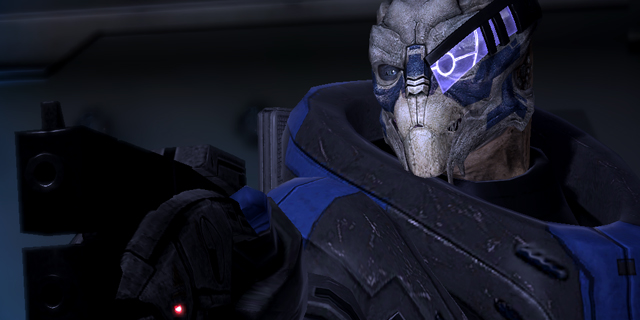
The cast of characters in an RPG is absolutely critical to how successful it’s going to be. If you can’t get your player to invest interest in at least one character, you’re doomed. If you can’t make any of your characters memorable, why bother? It’s who we remember. It’s who we care about. Their hopes and struggles become our hopes and struggles. We only quit the game when they’re safe in a cave, because we don’t like the idea of them shivering in the cold. We attach importance to people who aren’t real.
How do we remember these people? Each RPG has a huge cast. Each Suikoden game has a 108 allies you can recruit, and I’ve played six of those. We’re simply not going to have fond memories of every single person that we command in digital battle. But the ones we will remember have the distinct advantage of being in a game where camaraderie and relationships are explored, not ignored. They establish a dialogue with other party members that can be funny, dramatic, scary, intriguing or just plain silly. The goal is to build the plot and build the character development so you care. You invest. You save in a cave.
Conversation that consists of nothing but exposition really irks me. Two characters talking to each other, or rather telling at each other the plot devices, is not interesting. It doesn’t feel natural. When was the last time you met your friend with a “Ah, ERIC! My friend of 25 years. Isn’t it a great day to be under the rule of the Canadian Government in this fine city of Vancouver? I can’t even believe we have to go take an exam on monster hunting this afternoon. By the way, your mother Lorna came by and dropped off your lunch!”
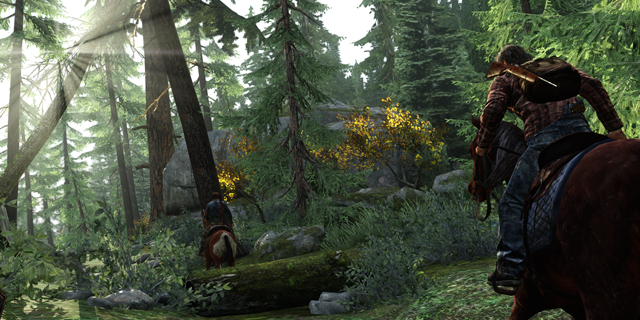
Nobody talks like this. I know you have to explain to the player who you are and what world you occupy, but show, don’t tell. Please! Take one look at The Last of Us, and see that the best way to immerse us in a video game world is to let us explore and deduce what kind of world we’re in, instead of long passages of boring conversation that I could’ve read in an instruction manual.
One of my favorite examples of party chat is a quiet scene in Chrono Trigger. It’s near the end of an optional side quest. If you choose to let your robot, Robo, tend the fields for 400 years, it will result in a beautiful forest. Once you pick him up in the future, you are shown a scene at night, in the forest. The whole gang is there; Crono is asleep, Magus is leaning against a tree, Lucca is attending to Robo’s inner circuitry and the others are just hanging out, chatting. That’s really all the scene is. They discuss a possible “entity” who might be responsible for their adventure through time. Who are they talking about? Is it the player? Is it some unseen god? It’s never revealed, nor should it be. This is not about plot movement or exposition; it’s just the characters you’ve spent hours with chatting around a campfire. Just friends chatting about life.
Lost Odyssey was filled with great moments, but one in particular stands out. It’s a moment so subtle, I wouldn’t blame you if you missed it. I almost did. Jansen, a goofy human mage who likes to get drunk and flirt with women, is reunited with his buddy Kaim, a stoic immortal who has seen nothing but battles and wars for 1000 years. The rest of the group is huddled a short distance away. If you blink, you’ll miss it, but Jansen and Kaim pat each other on the back and give a very realistic portrayal of concern. A quick “you all right?” is met with a nod and a “yeah.” That’s it.
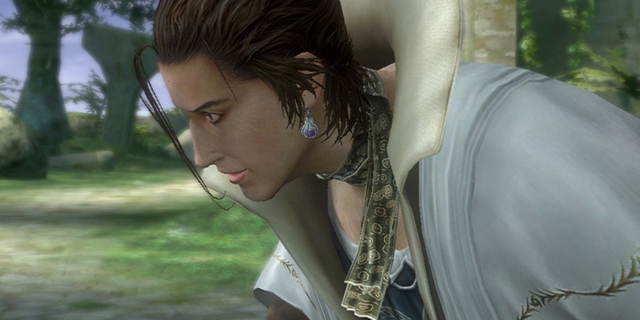
Most RPGs would have long winded speeches about friendship. About how Kaim couldn’t conceivably live if he knew his friend Jansen was dead, despite seeing many friends die throughout his 1000-year life. In a worse game, this would be overly emotional and full of exposition and, my least favorite, have a character’s name followed by an ellipsis.
“Henry…”
Yes? Oh I’m sorry, were you going to say something? You know, there’s other ways of conveying awkwardness. Or were you going for sadness? Surprise? Anger? It’s really hard to tell when a game just throws you a name and three dots. You ever get an email from somebody at work written like that? You feel like there’s a conspiracy. Or a trap waiting.
“There’s cake in the conference room…”
And? Cake in the conference room and what?
Lost Odyssey‘s graphics have aged a bit, but it still does a good job showing realistic interactions among friends. Unless you haven’t seen a friend in years, or it’s under dire circumstances, you’re not going to make an insane deal about seeing them again. When Kaim and Jansen do a quick checkup on how they are, there’s no big scene made of it. They’re walking towards the group as they’re saying it. It looks real.
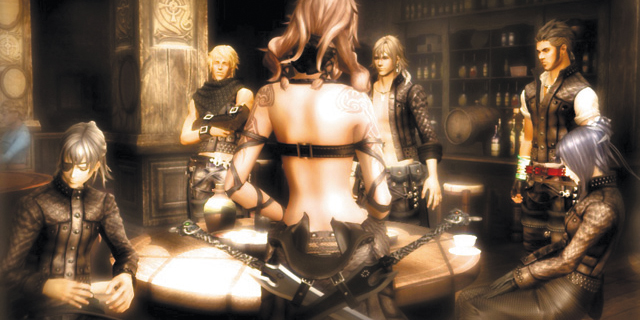
The Last Story, one of the last games made for the Nintendo Wii, tried to get this sort of party relationship, but didn’t quite succeed. I appreciated the character designs and the group mentality. I appreciated that the setting you found them in was the pub. I love pubs. More games should have scenes of a large group in a pub, drinking, drunk or somewhere in between. But when a conversation is displayed, you have semi-lifeless representatives not looking at each other while the rest of the screen is faded out. This kind of thing might work in a comic book, but not in a game.
For a conversation to work, for me to believe that these members care about each other, I need to see physical interaction. Body language and physical interaction is necessary. Is it a punch on the arm, a high five, a fist bump, a slap on the back of the head? Put in interruptions, breaks in the speech. If everybody is excited and drunk, make them sound excited and drunk! When was the last time you saw the cast of an RPG game sing a merry tune while slamming their drinks on the table? Maybe they discuss a monster they just killed and joke about it. Am I playing the wrong games?
I know why I don’t see more of this; it’s difficult and expensive. I have absolutely zero programming capability, so it’s easy for me to say “developers should do this” without understanding the incredible challenge involved of making digital sprites seem real. It’s also a headache for voice recording purposes. Most of the time, voice actors are alone in the studio; It’s much more difficult to coordinate ten different schedules so all the voice actors can all be in the studio at the same time. How many are set up to accommodate that many people talking?
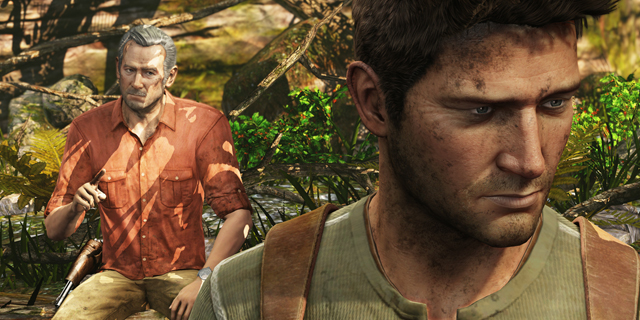
Uncharted, The Last of Us and Enslaved: Odyssey to the West all did an amazing job making conversation look and feel real. They used a lot of real actors to make interaction look much more authentic. But in most cases, there were only a few people talking at the same time, and even that took a huge amount of effort and innovation to pull off.
But we can dare to dream, can’t we? Wouldn’t you want to see the cast of Final Fantasy VI in a pub, drinking and eating while telling stories about their adventure? Edgar explaining machines to Cyan while he finishes his mutton stew? Sabin being egged on by Locke and Celes to chug his beer? Make the party in an RPG a party, and make us care. Make us be interested through meaningful, realistic dialogue instead of cliche-ridden exposition.
Imagining my party is safe in a cave is great. Now follow up; show us what they’re talking about in that cave. Where did they grow up? How did they learn to fight? What are their sleeping habits? Their favorite color? Their most-hated dish? The way the sun used to make the ocean glitter back home? The smallest details can reveal innermost desires, and that’s attractive to us.
Well, I’m off to the pub. Don’t forget to save.



















